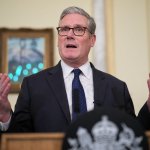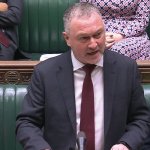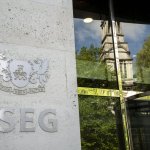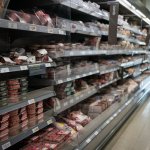The UK economy continued its recovery from recession at the end of last year as growth extended over the latest quarter, according to official data.
The Office for National Statistics (ONS) said gross domestic product (GDP) increased by 0.6% between April and June,
It was in line with economist predictions but is nevertheless a welcome boost for new Chancellor Rachel Reeves.
The ONS said there was no economic growth recorded for the month of June as weakness in services was offset by improvements in the manufacturing sector.
It came after no growth was recorded in April due to an impact from wet weather, and then 0.4% growth in May as the economy recovered.
The second-quarter performance came after 0.7% growth in the first quarter, following a shallow recession over the second half of 2023.
ONS director of economic statistics Liz McKeown said: “The UK economy has now grown strongly for two quarters, following the weakness we saw in the second half of last year.
“Growth across the three months was led by the service sector, where scientific research, the IT industry and legal services all did well.
“In June growth was flat with services falling, due to a weak month for health, retailing and wholesaling, offset by widespread growth in manufacturing.”
The service industry contracted by 0.1% for the month, as high street and wholesale retailers recorded a 1% drop.
Separate ONS figures released last month showed that the quantity of products bought by shoppers shrank by 1.2% in June, as retailers blamed uncertainty ahead of the general election.
Meanwhile, some industries also saw pressure linked to strike action over the month.
Anecdotal evidence recorded by the statistics body saw a dip in the human health sector linked to junior doctors strikes at the end of June.
Meanwhile, there was also lower output in the TV and film production industry, where the Screen Actors Guild strikes in America from 2023 are still affecting UK production schedules, according to firms.
On Thursday, the ONS said these weaknesses were partly offset by a stronger science services sector as well as widespread growth across the manufacturing industry.
Chancellor Rachel Reeves said: “The new Government is under no illusion as to the scale of the challenge we have inherited after more than a decade of low economic growth and a £22 billion black hole in the public finances.
“That is why we have made economic growth our national mission and we are taking the tough decisions now to fix the foundations, so we can rebuild Britain and make every part of the country better off.”
Some economists cautioned, however, that there is likely to be a “slowdown” in growth in the coming months, posing a potential challenge to the Government, which is hoping for strong growth to bring in higher tax revenues.
Sanjay Raja, UK chief economist at Deutsche Bank, said: “The good news is that this should lift the overall size of the economy, leaving the Chancellor with a slightly better near-term outlook than what the OBR (Office for Budget Responsibility) presented in March.
“But don’t expect the strong growth in H1 of 2024 to last. We should see some slowdown.
“Indeed, June GDP flatlined, with the services sector shrinking by 0.1%. Carry-over effects into the third quarter will be weaker.”
Peter Arnold, EY UK chief economist, appeared slightly more optimistic over growth prospects for the coming months.
“The prospect of rebounds in health and retail output in July means that Q3 should get off to a reasonable start,” he said.
“Beyond that, EY expects the economy to continue growing at a decent pace, though it will struggle to sustain the above-trend rates seen in H1 2024.”
Nomura chief European economist George Buckley said he believes the Bank of England will be “satisfied” with the picture of economic growth so far this year.
He said: “I think central banks are now looking a lot more closely at GDP figures relative to inflation.
“It’s not quite beaten yet, but the inflation genie has been put back in the bottle and I think now the focus is switching back towards the activity side, so these GDP numbers will be important.
“The Bank of England will be, I think, satisfied that they’ve done pretty well in the first half of the year.”











